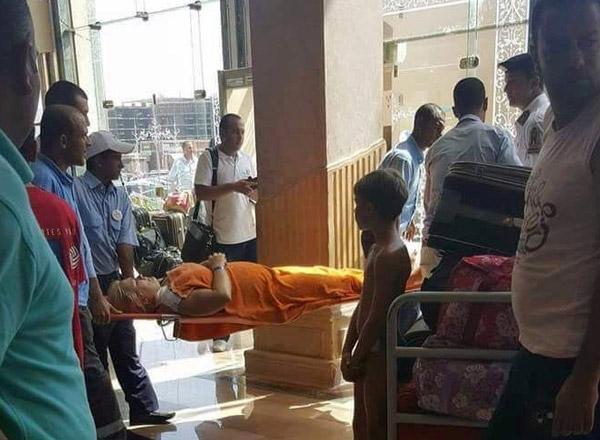You are here
Year on, Egypt still locked in Sinai battle with extremists
By AFP - Mar 12,2019 - Last updated at Mar 12,2019
CAIRO — One year after Egypt launched a large-scale operation against extremists in North Sinai, security forces remain locked in deadly battles against affiliates of the Daesh group.
Around 50 suspected militants were killed in the restive region on Monday, the army said.
What is North Sinai?
The Sinai Peninsula covers 60,000 sq.km in northeast Egypt bordering the Gaza Strip and Israel.
The arid desert is divided into two governorates, with the south popular among tourists for its beach resorts on the Red Sea.
The north is at the centre of a long-running insurgency that has gained strength since the military's 2013 ouster of Egypt's Islamist president Mohamed Morsi.
Residents of the turbulent region largely belong to Bedouin tribes with a history of tensions with Egyptian authorities.
With a media blackout in place, the beleaguered residents often resort to social media to tell of their situation amid the battles between security personnel and militants.
Journalists and independent investigators are barred from entering North Sinai but the Egyptian government has organised rare visits closely supervised by the military.
What is extremist threat?
Leading the insurgency in North Sinai is a local affiliate of the Daesh group known as “Sinai Province”.
The group, formerly called Ansar Beit Al Maqdis, had links with Al Qaeda before pledging allegiance to Daesh in 2014.
After Daesh suffered heavy territorial defeats in Syria and Iraq in 2017, Egypt went on the alert to prevent it from setting up a new stronghold in the Sinai.
There are no reliable figures on the number of Daesh-linked militants in Sinai, but experts give estimates of around 1,000.
Extremists have stepped up attacks on security forces and also targeted civilians, mainly Egypt’s minority Coptic Christians, killing hundreds of people.
“Since 2016, terrorist attacks in Egypt have primarily been carried out by the IS [Daesh] affiliates,” says Allison McManus of the Washington-based Tahrir Institute for Middle East Policy (TIMEP).
Smaller groups and others affiliated with Al Qaeda have carried out sporadic attacks across the country. “Particularly in North Sinai, many attacks are carried out anonymously,” says McManus.
In late 2017, North Sinai was the scene of the deadliest attack in Egypt’s modern history when militants killed more than 300 worshippers at a mosque, without any group claiming responsibility.
In response, President Abdel Fattah Sisi ordered security forces to use “all brute force” to restore stability to Sinai within “three months”.
Response
On February 9, 2018, Egypt mobilised land, sea and air forces in a nationwide offensive dubbed “Sinai 2018” against militants.
The operations are focused on North Sinai but also cover parts of the Nile Delta region and the porous western border with Libya.
In their long-running battles in North Sinai, Egyptian security forces have cooperated with local tribes as well as neighbouring Israel.
“We have a wide range of coordination with the Israelis,” Sisi said in an interview with the US network CBS last month.
It remains unclear how much longer the offensive will run.
The Tahrir Institute says the average monthly rate of reported attacks in North Sinai increased between the first and the second half of 2018 from 15 to 21 attacks.
“Today, despite years of military campaigns of which ‘Sinai 2018’ is the most recent and most important, the terrorist threat remains in Egypt,” says McManus.
What are the results?
Some 600 suspected militants and around 40 soldiers have been killed in the offensive, according to official figures.
Some analysts say the conventional army tactics of air strikes and ground operations may weaken Daesh but will not necessarily wipe it out.
“Remnants of the group continue to shift around the northeast of the Sinai Peninsula while the military operates more statically,” says Zack Gold, Middle East analyst at the CNA think-tank.
“Worse, given that Egypt has disrupted but not destroyed militant infrastructure, the group is in a position to rebound as soon as forces redeploy.”
This “is perhaps why the military has been unable to declare a conclusion to the operation”, he says.
Egyptian forces have destroyed hundreds of cross-border tunnels with Gaza and created a buffer zone to prevent militant infiltration and weapons smuggling.
In the face of the prolonged campaign, Sisi told CBS that the battle against militants requires patience.
“Why hasn’t the US eliminated the terrorists in Afghanistan after 17 years and spending a trillion dollars?” he countered when asked about the Egyptian army’s inability to quell the insurgency.
Related Articles
CAIRO — Egypt will try 292 suspected militants over plots to assassinate President Abdel Fattah Al Sisi and the Saudi crown prince and attac
CAIRO, Egypt — Egypt’s military said on Wednesday it had killed an extremist leader in the Sinai Peninsula, where the Daesh terrorist group
CAIRO — Security forces have killed nine militants in the Sinai Peninsula and also destroyed 15 vehicles transporting weapons into Egypt acr

















